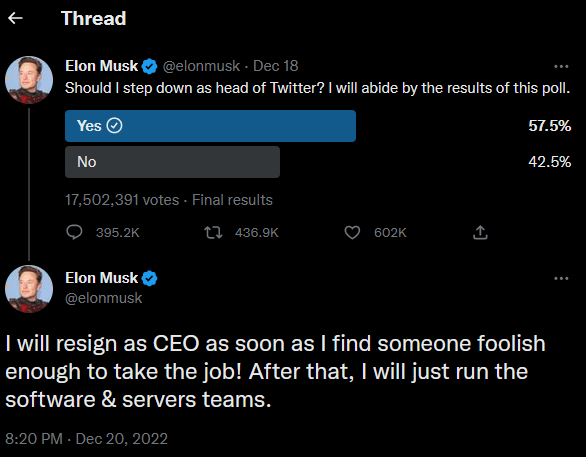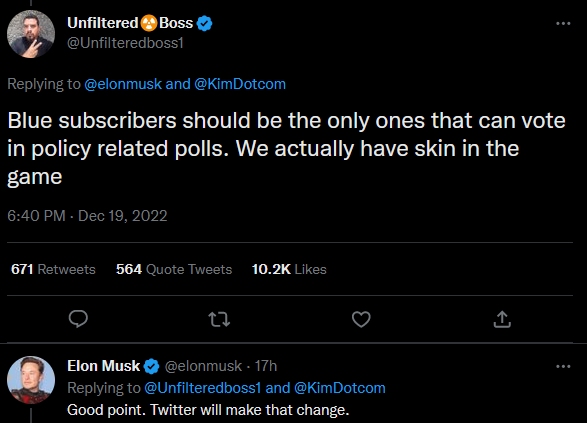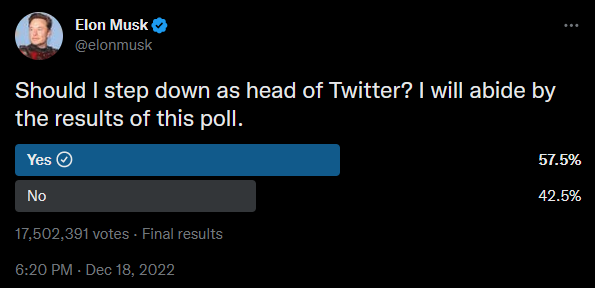Under self-proclaimed “free speech absolutist” and CEO Elon Musk, Twitter has banned the accounts of several people, including journalists that were critical of Musk, completely shut down the popular Spaces feature after Musk was confronted by journalists in a Space, and also suspended the account of rival social media network Mastodon. Moreover, Twitter now marks links to Mastodon as “potentially harmful.”
These very obviously pro-free speech moves come after Twitter suspended the ‘@ElonJet’ account run by ‘@jxckSweeney,’ whose account was also suspended. As a quick refresher, Musk has had an issue with Sweeney and the ElonJet account for a while since the account shared publicly available information about which airports Musk’s private jet flew to. Since then, Twitter has banned other accounts that track flight locations, including some that track other billionaires like Jeff Bezos or Bill Gates. Sweeney operated many of the accounts.
On December 14th, Musk claimed a stalker used information from the ElonJet account to follow a car carrying Musk’s son, X Æ A-Xii, thinking Musk was in the car, although the LA Times reported that no crime reports about the incident had been filed with the LAPD.
Shortly after, Twitter hastily introduced a new policy banning people from sharing other people’s private information, such as “real-time and/or same-day” location information (sometimes called ‘doxxing’). The policy also covers links to third-party URL(s), which is likely at least part of the reason why Twitter is blocking links to Mastodon — Twitter suspended Mastodon’s Twitter account after it shared a link to ElonJet’s Mastodon account. Moreover, several of the journalists who received suspensions shared links to ElonJet on other platforms like Mastodon.
Banned journalists join a Twitter Space, Musk kills Spaces
The Verge reports that several of the banned journalists were able to join a Twitter Space on December 15th where they discussed what was going on. Musk also joined the Space and answered some questions. During the conversation, Musk accused journalists who posted links to ElonJet on other platforms were evading the ban, which is why they also got banned.
The Washington Post’s Drew Harwell asked Musk how his decision to ban ElonJet and accounts sharing links to ElonJet differed from Twitter’s treatment of the Hunter Biden laptop story in 2020, something Musk previously called “incredibly inappropriate.” As a reminder, Twitter blocked links to the New York Post’s story about the alleged Hunter Biden laptop — that event became a cornerstone of Musk’s first ‘Twitter Files’ release, which included internal Twitter documents about the moderation decision.
Musk responded to Harwell by saying, “You dox, you get suspended. End of story, that’s it.” He then left the Twitter Space. Since then, Twitter shut down the Spaces feature — Muks claimed in a tweet that Spaces was shut down to fix a “legacy bug” and that the feature should return on December 17th. Presumably that legacy bug was the ability for banned accounts to join a Space.
Of course, I’d be remiss not to point out that Musk’s new anti-doxxing stance apparently doesn’t appear to apply to him or his allies. For example, the first Twitter Files release doxed Twitter co-founder Jack Dorsey’s email address, while Musk himself posted a video of the alleged stalker, which included the person’s licence plate, and asked if anybody recognized the person. And if you need more proof that Musk is a hypocrite, here’s his tweet from November 6th, 2022, saying he was so committed to free speech he wouldn’t ban the account following his plane (plus a screenshot below in case Musk decides to delete the tweet, as he tends to do).
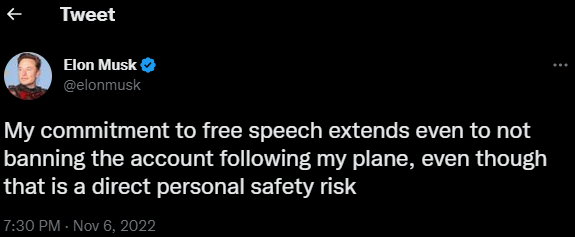
Per The Verge, Musk ran a poll asking if he should unsuspend accounts that “doxxed my exact location in real-time,” but the ‘now’ option won was winning with about 43 percent support. Musk then tweeted there were “too many options” and restarted the poll with the options ‘Now’ and ‘In 7 days.’ At the time of writing, ‘Now’ was winning with 58.6 percent of the vote. Musk certainly likes to base moderation decisions on polls, such as when he broke his promise and reinstated former U.S. president Donald Trump’s Twitter account.
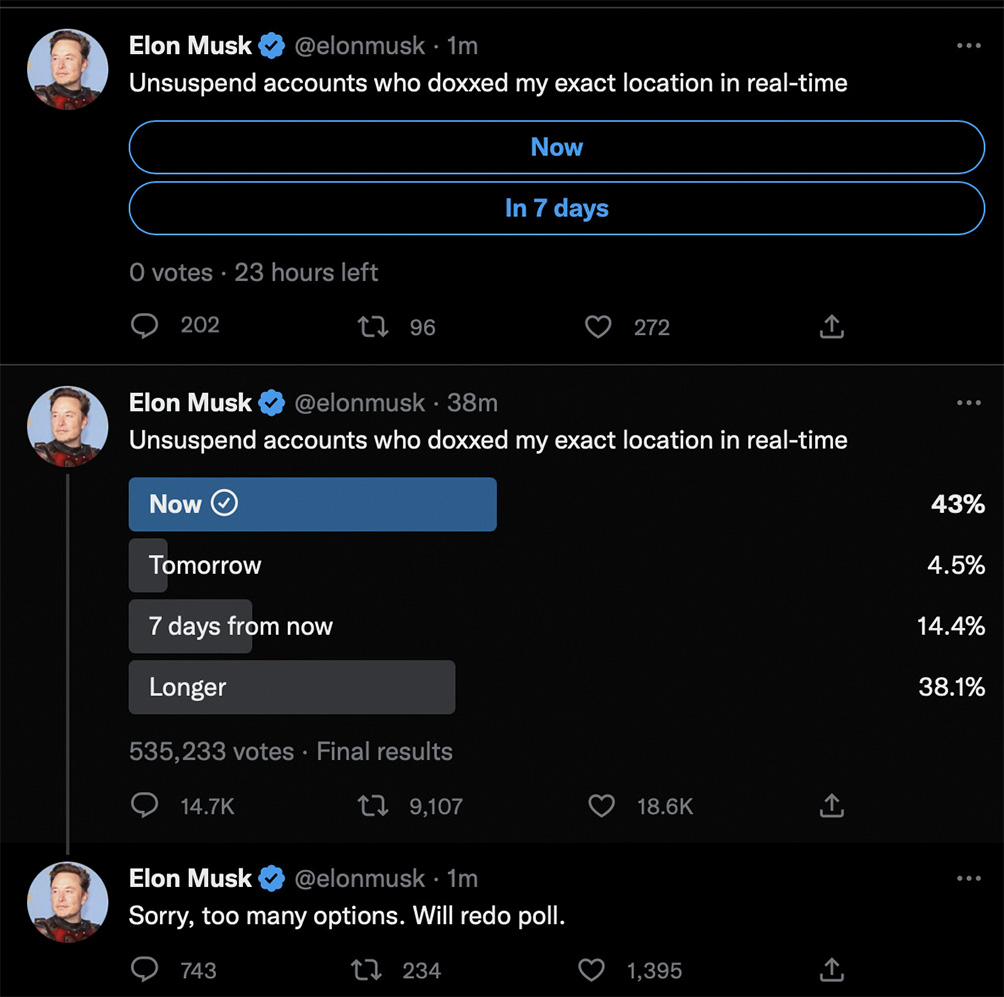
Screenshot of Musk’s redone poll. Via: The Verge
EU sanctions
Finally, the EU is planning to sanction Twitter over the arbitrary bans, with the EU Commission’s vice president of values and transparency, Vera Journova, tweeting that the suspension of journalists “is worrying.”
According to Mashable, tweets from some suspended journalists didn’t violate Twitter’s policy, including the publication’s own Matt Binder. Binder said his account was suspended after sharing a screenshot of a tweet from CNN’s Donie O’Sullivan about the LAPD’s statement regarding Musk’s stalker claims.
So, to sum things up: Twitter banned the ElonJet account after Musk said he wouldn’t ban it, banned journalists who tweeted about ElonJet getting banned, and banned rival social media platform Mastodon that was hosting the ElonJet account, as well as put warning labels on links to Mastodon, and now the EU Commission is looking into what’s going on and might sanction Twitter over the suspensions.
You can keep up with all things Musk and Twitter here.



